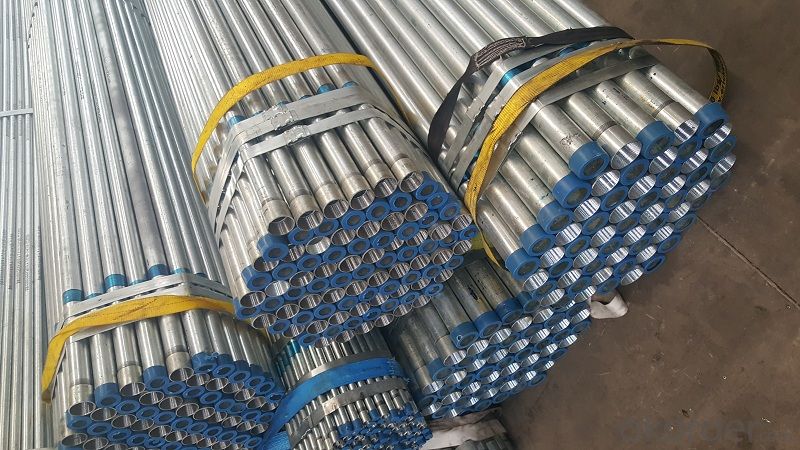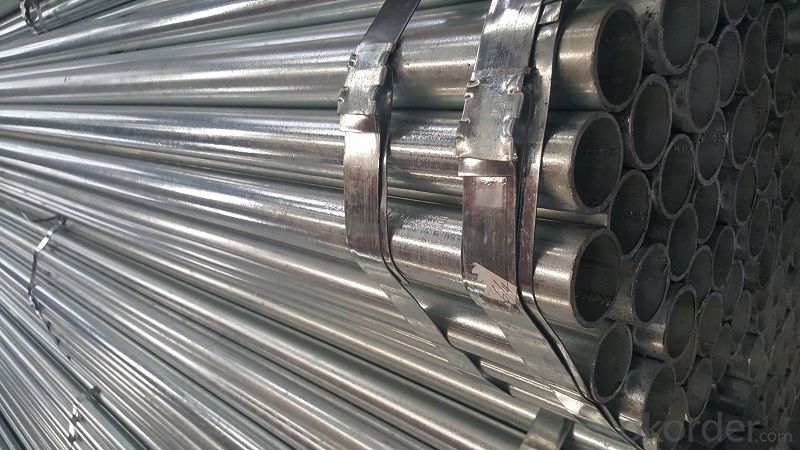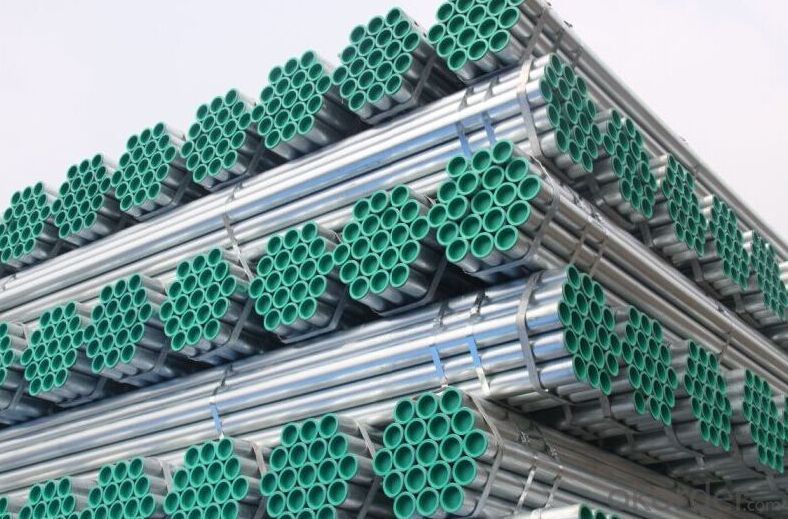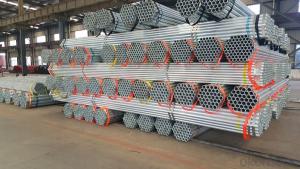Galvanized welded steel tubes for mechanical equipment
- Loading Port:
- Tianjin
- Payment Terms:
- TT OR LC
- Min Order Qty:
- 15 m.t.
- Supply Capability:
- 15000 m.t./month
OKorder Service Pledge
OKorder Financial Service
You Might Also Like
Item specifice
1、Structure of Galvanized welded steel pipe for materials :
The surface of galvanized steel pipe welded steel pipe of hot dip galvanized layer or. Galvanized can increase the corrosion resistance of the steel tube, prolong service life. Galvanized pipe is widely used, in addition to water, gas, oil and other general low pressure fluid pipelines. It is also used in the petroleum industry, especially for offshore oil field of oil well pipe and oil pipe, chemical, coking equipment of oil heater, condensation cooler, coal run oil exchanger tube, and trestle pile, the mine tunnel support frame tube.
2、Main Features of Galvanized welded steel pipe for building materials :
• High manufacturing accuracy
• High strength
• Good visual effect
• Reasonable price
3、 Galvanized welded steel pipe for building materials Specification:
Standard | GB, DIN, ASTM ASTM A106-2006, ASTM A53-2007 |
Grade | 10#-45#, 16Mn 10#, 20#, 45#, 16Mn |
Thickness | 1 - 33 mm |
Section Shape | Round |
Outer Diameter | 21 - 610mm |
Place of Origin | Tianjin, China (Mainland) |
Secondary Or Not | Non-secondary |
Application | Hydraulic Pipe |
Technique | Cold Drawn |
Certification | API |
Surface Treatment | factory state or painted black |
Special Pipe | API Pipe |
Alloy Or Not | Non-alloy |
Length | 5-12M |
Outer Diameter | 21.3-610mm |
Grade | 20#, 45#, Q345, API J55, API K55, API L80, API N80, API P110, A53B |
Standard | ASME, ASTM |
1) Material:Q195 Q235 Q345 X42 X52
2) Specification range:OD:21.3-610mm,WT:6-70mm,length:6-12m or according to the requirement of clients.
3) Excutive standards:GB,ASME API5L.ASTM A 106/A53,Despite of the above standards,we can also supply seamless steel pipe with standard of DIN,JIS,and so on,and also develop new products according to the requirements
4、Packaging & Delivery
Packaging Details: | seaworthy package,bundles wrapped with strong steel strip |
Delivery Detail: | 15-30days after received 30%TT |
5、FAQ of Galvanized welded steel pipe for building materials :
①How is the quality of your products?
Our products are manufactured strictly according to national and internaional standard, and we take a test
on every pipe before delivered out. If you want see our quality certifications and all kinds of testing report, please just ask us for it.
Guaranteed: If products’ quality don’t accord to discription as we give or the promise before you place order, we promise 100% refund.
②How about price?
Yes, we are factory and be able to give you lowest price below market one, and we have a policy that “ for saving time and absolutely honest business attitude, we quote as lowest as possible for any customer, and discount can be given according to quantity”,if you like bargain and factory price is not low enough as you think, just don’t waste your time.Please trust the quotation we would give you, it is professional one.
6、 Galvanized welded steel pipe for building materials Images:



- Q:What are the different testing methods for steel pipes?
- Some of the different testing methods for steel pipes include visual inspection, ultrasonic testing, magnetic particle testing, radiographic testing, and hydrostatic testing.
- Q:How do steel pipes handle extreme temperatures?
- Steel pipes can handle extreme temperatures due to their high strength and thermal stability. The properties of steel, such as its excellent heat resistance and low thermal expansion, allow it to withstand both high and low temperatures without significant deformation or structural damage. Additionally, the use of specialized coatings and insulation can further enhance the heat resistance of steel pipes, making them suitable for a wide range of applications in extreme temperature environments.
- Q:Can steel pipes be used for underground sewage systems?
- Yes, steel pipes can be used for underground sewage systems. Steel pipes are known for their durability and strength, making them suitable for underground applications. However, it is essential to ensure that the steel pipes are properly coated or protected against corrosion to prevent damage from sewage and soil conditions.
- Q:What are the different types of steel pipe flanges?
- There are several different types of steel pipe flanges, including slip-on flanges, weld neck flanges, socket weld flanges, threaded flanges, blind flanges, lap joint flanges, and orifice flanges. Each type has its own unique design and purpose, catering to specific applications and requirements in various industries.
- Q:How are steel pipes manufactured?
- Steel pipes are manufactured through a process called pipe manufacturing or pipe making, which involves various steps such as forming, welding, and finishing. The process starts with the procurement of raw materials, which are typically steel coils or sheets. These coils are then fed through a series of rollers to shape them into a cylindrical form. The edges of the coils are then welded together to create a continuous pipe. After welding, the pipes undergo various finishing processes such as sizing, straightening, and cutting to achieve the desired dimensions and specifications. Finally, the pipes are tested for quality assurance and may undergo additional treatments like galvanization or coating before being ready for use in different industries and applications.
- Q:Are steel pipes suitable for solar power plants?
- Yes, steel pipes are suitable for solar power plants. They are commonly used in various applications within the plant, such as carrying water for cooling systems and transporting steam in concentrated solar power (CSP) plants. Steel pipes offer durability, strength, and resistance to corrosion, making them a reliable choice for the demanding conditions of a solar power plant.
- Q:How are steel pipes used in seaport infrastructure?
- Steel pipes are commonly used in seaport infrastructure for various purposes such as constructing piers, docks, and wharves. They are also used in the construction of offshore platforms and maritime structures like breakwaters and jetties. Steel pipes provide the necessary strength and durability to withstand the harsh marine environment and are used for the transportation of water, fuel, and other fluids within the port. Additionally, they are employed in the construction of pipelines for the loading and unloading of cargo ships, as well as for dredging and marine construction activities.
- Q:How do steel pipes connect to other components?
- Steel pipes can connect to other components through various methods such as welding, threading, flanges, or mechanical couplings.
- Q:How are steel pipes used in the construction of wind farms?
- Steel pipes are commonly used in the construction of wind farms to support and secure the wind turbines. These pipes serve as the foundation for the turbines, providing stability and structural integrity. They are used to create the tower structure, which supports the nacelle and rotor blades. Additionally, steel pipes are used for transporting and distributing the electrical cables within the wind farm, ensuring efficient transmission of electricity generated by the turbines.
- Q:What are the standard dimensions and weight of steel pipes?
- The standard dimensions and weight of steel pipes can vary depending on the specific type and grade of steel pipe being used. However, common standard dimensions for steel pipes include sizes ranging from 1/8 inch to 48 inches in diameter, with wall thicknesses ranging from Schedule 5 to Schedule 160. As for weight, it also depends on the diameter and wall thickness, but a general guideline is that a 1-inch diameter steel pipe with a 1/4 inch wall thickness weighs approximately 1.02 pounds per foot. It is important to note that these dimensions and weights can vary based on the specific standards and requirements set by different industries and applications.
1. Manufacturer Overview |
|
|---|---|
| Location | |
| Year Established | |
| Annual Output Value | |
| Main Markets | |
| Company Certifications | |
2. Manufacturer Certificates |
|
|---|---|
| a) Certification Name | |
| Range | |
| Reference | |
| Validity Period | |
3. Manufacturer Capability |
|
|---|---|
| a)Trade Capacity | |
| Nearest Port | |
| Export Percentage | |
| No.of Employees in Trade Department | |
| Language Spoken: | |
| b)Factory Information | |
| Factory Size: | |
| No. of Production Lines | |
| Contract Manufacturing | |
| Product Price Range | |
Send your message to us
Galvanized welded steel tubes for mechanical equipment
- Loading Port:
- Tianjin
- Payment Terms:
- TT OR LC
- Min Order Qty:
- 15 m.t.
- Supply Capability:
- 15000 m.t./month
OKorder Service Pledge
OKorder Financial Service
Similar products
New products
Hot products
Related keywords






























